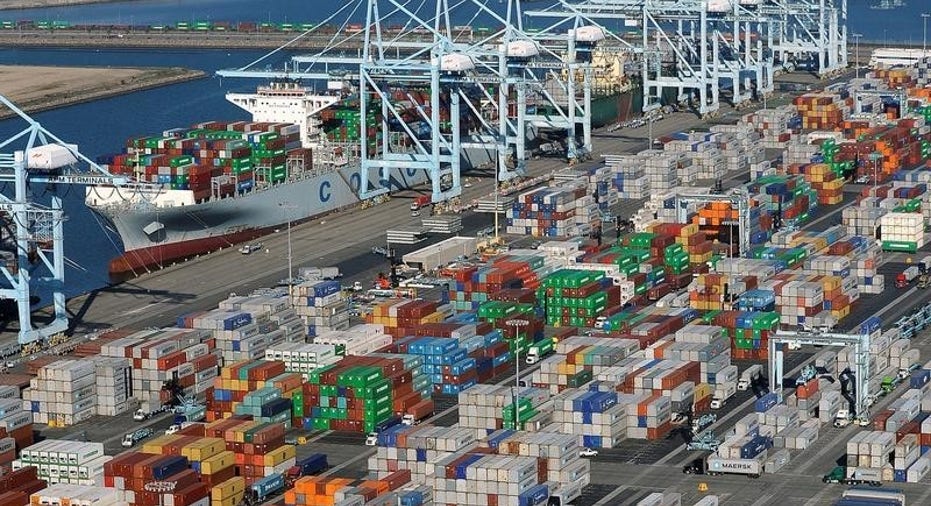World Trade Set For Slowest Yearly Growth Since Global Financial Crisis

World trade will this year grow at the slowest pace since the global financial crisis, a development that should serve as a "wake-up call" given rising antiglobalization sentiment, the World Trade Organization warned Tuesday.
The Geneva-based body responsible for enforcing the rules that govern global trade cut its forecast for the growth of exports and imports this year and next, and now foresees an increase of just 1.7% in 2016 and as little as 1.8% in 2017, having projected rises of 2.8% and 3.6%, respectively, in April.
The WTO joined other international bodies -- such as the Organization for Economic Cooperation and Development -- in warning a slowdown in trade could weaken longer-term economic growth.
"The dramatic slowing of trade growth is serious and should serve as a wake-up call," said Roberto Azevedo, the WTO's director-general. "It is particularly concerning in the context of growing antiglobalization sentiment. We need to make sure that this does not translate into misguided policies that could make the situation much worse, not only from the perspective of trade but also for job creation and economic growth and development which are so closely linked to an open trading system."
In their debate on Monday, Republican presidential nominee Donald Trump and Democratic nominee Hillary Clinton clashed over trade policy. Mr. Trump threatened to use tariffs to narrow the trade deficit, while Mrs. Clinton warned such action could ignite a trade war. Both want to block the Trans-Pacific Partnership, a trade pact negotiated among a dozen Pacific Rim nations, including the U.S. and Japan.
The WTO said the cut in its forecast was a response to weak trade growth in China, Brazil and North America during the first six months of the year. According to its figures, trade in goods fell 1.1% n the first three months of 2016, and while there was a rebound in the three months to June, it was "smaller than anticipated" at just 0.3%.
The trade body said over the longer term, world trade has usually grown 1.5 times as rapidly as total economic output. During the period of rapid globalization in the 1990s, trade grew at twice the rate of economic output. However, the WTO's projection for 2016 suggests it will be the first time in 15 years that trade will grow more slowly than total output.
Economists say increased trade helps fuel more robust economic growth by helping locate production where it is most efficient and increasing competition.
There is some dispute among economists about why trade has continued to slow even after the worst effects of the financial crisis appear to have abated. Some argue a slowdown reflects a reversal in the creation of what are known as global value chains, or the process by which large companies moved parts of their production and associated jobs overseas.
Others point to a rise in protectionist measures other than tariff increases -- which are regulated by the WTO -- while the United Nations Conference on Trade and Development argues the slowdown is because of weak demand in developed economies that have been through austerity programs and deliberate efforts to keep wages low.
The International Monetary Fund on Tuesday offered its analysis of the slowdown, concluding that ordinary economic weakness -- including the "synchronized slowdown in economic activity" through much of the world and a dearth of investment -- is responsible for as much as three-quarters of the collapse in trade between the precrisis years starting in 2003 and the postcrisis years.
That isn't to say the other suspected causes don't play a role, too. The IMF says other factors -- including the lack of trade agreements and shrinking supply chains -- have shaved 1.75 percentage points a year off global trade growth since 2012. That is a significant drag that reduced trade by 8% last year compared with what it would have been.
Some factors driving the slowdown may prove temporary. The WTO said a striking feature of the past two years has been a large fall in imports to countries that in turn rely heavily on exports of commodities, reflecting big falls in commodity prices. Those imports stabilized in the three months to June, and there have been signs of a pickup in world trade since the end of the second quarter.
But the WTO warned that trade growth may prove even slower than forecast over coming years, citing a range of risks that include the U.K.'s decision to leave the European Union, "which has increased uncertainty about future trading arrangements in Europe, a region where trade growth has been relatively strong."



















